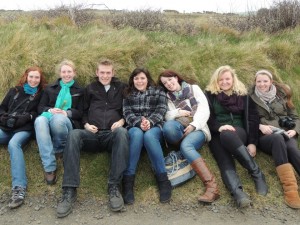By Ellie Koewler ’15
For the third consecutive year, Dr. Haley Duschinski has led students on a Spring Break trip to Northern Ireland with Anthropology course ANTH 4620: Human Rights, Law, and Justice.

Students pose outside of Alternatives, a community-based restorative justice organization on Shankill Road in Belfast in 2015.
The nine-day course examines the post-conflict society of Northern Ireland after “the Troubles” in the 1970s and 1980s, highlighting an anthropological approach to political transition, dealing with the past, contested memories, and the legacy of human rights abuses.
The course is sponsored by the Anthropology program and the Center for Law, Justice & Culture.
Pre-Departure Preparations
Prior to leaving for the trip, students met with Duschinski, Associate Professor of Anthropology, to understand the history of contention in the region. These pre-departure meetings encouraged students to research independently through journals, books, news outlets, and film to better understand the cultural landscape and have thoughtful discussions as a group.
“Before the trip, we spent a lot of time discussing storytelling, identity, and healing in a post-conflict society,” explains Business Pre-Law major and Law, Justice & Culture certificate student Angelina Moore ’16. “We discussed how to appropriately ask questions and how to maintain an anthropological lens when sifting through the different perspectives of the Troubles. During the trip, I used the knowledge I obtained prior to really dive into the complex issues but still remain respectful of the sensitive nature of the interviews. I used my anthropological training after the trip as well to remain neutral when looking over my field notes, since the trip was highly charged with emotion.”
Experiential Learning
Students visited the large metropolitan areas of Derry, Omagh, and Belfast, as well as small country towns and scenic landscapes of Giant’s Causeway and Dunluce Castle. Students were encouraged to explore independently and to engage with locals to absorb culture, history, politics, and religion of the region. Rather than being lecture-centered, the experiential learning gave students a deeper understanding of the themes and concepts discussed in pre-departure meetings by interacting with the local people and places that naturally brought the topics of human rights, law and justice to life.
These experiences included walking tours of conflicting neighborhoods, exploring cityscapes, candid conversations with former political prisoners, tours of jails, discussing conflict resolution, and visiting museums, non-profits, and sites of contention.
During their time abroad, students had to submit daily logs of their activities, insights, and memorable experiences. This exercise not only provided students a resource for developing a post-trip paper, but also demonstrated the importance and methodology of field notes.
“As a sophomore, I hadn’t had much opportunity to apply what little anthropology training I had,” says Anthropology major Samantha Rommel ’15, who attended the pilot trip in 2013. “The trip was an immersive learning experience, almost a ‘crash course’ in field methods, which I am so grateful for having now that I’m a senior. I was directly involved in practicing anthropology, but also had the benefit of learning from Dr. Duschinski, who was a wonderful model for how to conduct ethical, ethnographic fieldwork. The trip set up the rest of my years at OU, and set me on a path I never expected I’d be on! I became more involved in scholarship on human rights in a post-conflict setting, first in Northern Ireland and then other parts of the world.”
Developing Post-Trip Research
After the trip, students met again as a group with Duschinski to reflect on their experiences and begin their final independent papers. The papers are based on academic readings and site interviews, and they address issues such as the challenges of negotiating shared space, the challenges of truth recovery, and the challenges of heritage projects in this post-conflict setting.
Several students from past trips have returned to Northern Ireland to continue research. Anthropology majors Lydia Weiant ’16 and Erin Noonan ’16 will return this summer to develop their senior anthropology honors theses. The goal of Noonan’s research is to understand how artist collectives are reinventing Belfast through new forms of cultural production and how these forms express urban identity. Weiant’s thesis examines extra-legal policing in Belfast by analyzing how individuals engaged with local conflict resolution projects understand justice and the relationship between community identities and formal legal systems.
Transformative Take-Aways
“Even though we were only in Northern Ireland for 10 days, because of the way the trip was put together, I felt very connected to the land and the people living there,” says Moore, explaining the impact the trip. It is really indescribable the transformation I felt after this trip, and I really recommend that people go. I learned just as much during the planned activities as I did during unplanned activities, like talking about life with the locals while out to eat.”
African Studies and Political Science major and Law, Justice & Culture certificate student Luke Kubacki adds, “I absolutely recommend this trip to other people. The course material is fascinating and the people with whom you meet are interesting and very capable of presenting their perspective in compelling ways. This trip is jam-packed full of programming, but you somehow have loads of free time to explore, meet people, and experience the cultures in Belfast and Derry. Both the academic content and the independent time spent exploring were useful and memorable.”
This study abroad program aligns with the Making and Breaking the Law and War and Peace thematic track, and it counts toward the requirements for the Law, Justice & Culture certificate and the War and Peace Studies major and certificate.
For more information, contact Duschinski at duschins@ohio.edu.


















Comments